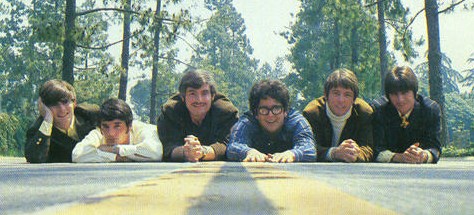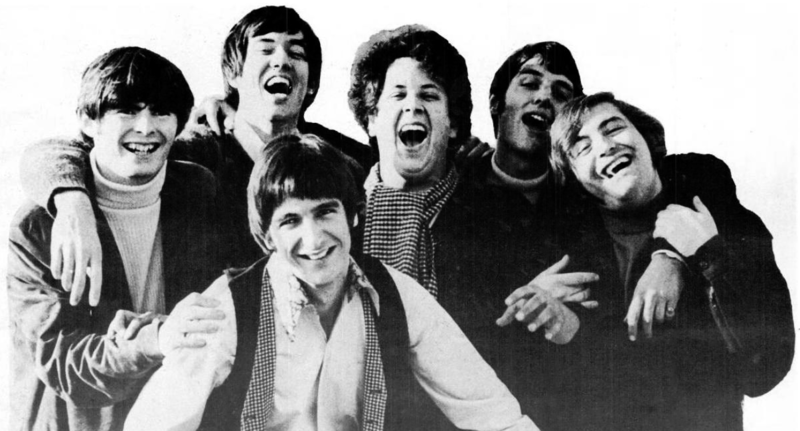The Turtles
Also known as The Tyrtles
Origin Los Angeles, California, United States
Genres
Sunshine pop pop rock psychedelic pop folk rock
The Turtles are an American rock band led by vocalists Howard Kaylan and Mark Volman. The band had several Top 40 hits beginning with their cover version of Bob Dylan’s “It Ain’t Me Babe” in 1965. They scored their biggest and best-known hit in 1967 with the song “Happy Together”.
The band broke up in 1970. Kaylan and Volman later found long-lasting success as session musicians, billed as the comedic vocal duo Flo & Eddie. In 2010, a reconstituted version of the band, the Turtles Featuring Flo & Eddie, began performing live shows again.
The band, originally a surf-rock group called the Crossfires, was formed in 1965 in Westchester, Los Angeles, by high school friends Kaylan, Volman, Al Nichol, Chuck Portz, Don Murray, and Jim Tucker. With the help of KRLA and KFWB DJ and club owner Reb Foster (b. James Dennis Bruton 1936), the Crossfires signed to the newly formed White Whale Records. Adhering to the prevailing musical trend, they rebranded themselves as a folk rock group under the name the Tyrtles, an intentionally stylized misspelling inspired by the Byrds and the Beatles. However, the trendy spelling did not survive long.
As with the Byrds, the Turtles achieved breakthrough success with a cover of a Bob Dylan song. “It Ain’t Me Babe” reached the Billboard Top Ten in the late summer of 1965, and was the title track to the band’s first album. Their second single, “Let Me Be,” reached the top 30, while their third hit, “You Baby,” charted in the top 20 in early 1966. The band’s second album, You Baby, failed to reach Billboard’s Top LPs chart, and of several singles released in 1966, “Grim Reaper of Love” and “Can I Get to Know You Better” barely entered the Billboard Hot 100. One single, the tough “Outside Chance”, written by Warren Zevon and featuring guitar work in the style of the Beatles’ “Taxman”, didn’t chart at all. In 1966, the Turtles made an appearance in Universal’s beach party spy spoof film Out of Sight, singing “She’ll Come Back” on screen.
At the start of 1966 drummer Don Murray and bassist Chuck Portz quit the group. They were replaced by Joel Larson and then John Barbata on drums, and by Chip Douglas on bass (October 1966).
The first of several key Turtles singles co-written by Garry Bonner and Alan Gordon, “Happy Together”, had already been rejected by countless performers. “Happy Together”, both their biggest hit and their signature song, signaled a turning point for both the Turtles and for Chip Douglas, who provided the arrangement. The single replaced the Beatles’ “Penny Lane” at number one on the Billboard Hot 100 in the spring of 1967. The Turtles’ only No. 1 remained there for three weeks. An album of the same name followed and peaked at No. 25. “Happy Together” reached #12 on the UK singles chart.This same year saw the Turtles performing the title song (composed by John Williams with lyrics by Leslie Bricusse) for the Twentieth Century-Fox bedroom farce A Guide for the Married Man.
Impressed by Chip Douglas’s studio arrangements, Michael Nesmith approached him after a Turtles show at the Whisky a Go Go and invited him to become the Monkees’ new producer, as that band wanted to break out of their “manufactured” studio mold. Douglas accepted and left the Turtles. He was replaced by Jim Pons on bass.
1967 proved to be the Turtles’ most successful year on the music charts. “She’d Rather Be with Me” reached number 3 on the US charts in late spring and actually out-charted “Happy Together” overseas, reaching #4 in the UK.[3] Two successive Top 15 songs followed: “You Know What I Mean” and “She’s My Girl”. Both 45s signaled a certain shift in the band’s style. Golden Hits was released later that year, charting in the top 10. The similar album covers for The Turtles! Golden Hits and its follow up More Golden Hits were designed by Dean Torrence of Jan & Dean.
In 1968, rhythm guitarist Jim Tucker left the band citing the pressure of touring and recording new material. He moved to Grass Valley where he became an electrical contractor. He denies the myth that he left the band because John Lennon was rude to him as suggested by the Turtles’ lead singer Howard Kaylan.
The first two singles in 1968, “Sound Asleep” and “The Story of Rock and Roll”, stalled somewhere in the middle of the top 100. The band’s fortunes changed when Chip Douglas returned to work with them in the studio. Late in 1968 the band released a concept album called The Turtles Present the Battle of the Bands, in which the group pretended to be 11 different bands (with fanciful names including ‘The Bigg Brothers’, ‘Nature’s Children’, ‘the US Teens featuring Raoul’, and ‘the Fabulous Dawgs’), each with a song in a different genre. The album yielded two singles: “Elenore” and “You Showed Me” (both peaking at No. 6). “Elenore” also reached No. 7 in the UK chart. The 1969 hit “You Showed Me” had been written by the Byrds’ Gene Clark and Roger (then Jim) McGuinn in 1964. Television appearances included a February 1968 spot on The Mike Douglas Show, to which they returned in April 1969.
Towards the end of 1969, the group released its next album, Turtle Soup, a critically well-received LP produced by Ray Davies of the Kinks. Inspired by the revered 1968 concept album The Kinks Are the Village Green Preservation Society, this was Davies’s only released production work for another band (although Davies had previously produced demo recordings for The Iveys). Notable tracks include “Somewhere Friday Nite” and “Love in the City”. In spite of Turtle Soup’s positive reception from the music press, its commercial success was marginal and the band soon began to disintegrate.
Long disillusioned with their record label and its growing financial problems by this time, Kaylan and Volman resisted White Whale’s efforts to turn the Turtles into something approaching an assembly-line pop act. The label apparently encouraged Kaylan and Volman to fire the rest of the band, tour with hired musicians and make records by adding their vocals to backing tracks recorded by Memphis session players. Such pressure did convince the band to record a single called “Who Would Ever Think That I Would Ever Marry Margaret?”, which they disowned after its release.
The Turtles wound down their career in 1970 with a second compilation album, More Golden Hits, and a B-sides and rarities album, Wooden Head. With the demise of the Turtles, White Whale Records was left with few commercially viable bands, and soon ceased operation.
Discography
Studio albums
Year Album US Top 200 Label
1963 Out Of Control (as the Crossfires) — (none)
1965 It Ain’t Me Babe 98 White Whale
1966 You Baby —
1967 Happy Together 25
1968 The Turtles Present the Battle of the Bands 128
1969 Turtle Soup 117
1970 Wooden Head —
1986 Chalon Road — Rhino
Shell Shock
Singles
Year Title (A-side / B-side)
Both sides from same album except where indicated Billboard Hot 100 Album Label
1965 “It Ain’t Me Babe” / “Almost There” (from You, Baby) 8 It Ain’t Me, Babe White Whale
“Let Me Be” / “Your Maw Said You Cried (In Your Sleep Last Night)” 29
1966 “You Baby” / “Wanderin’ Kind” (from It Ain’t Me, Babe) 20 You, Baby
“Grim Reaper of Love” / “Come Back” (from Wooden Head) 81 Golden Hits
“Outside Chance” / “We’ll Meet Again” (from Wooden Head) —
“Making My Mind Up” / “Outside Chance” (from Golden Hits) — Happy Together
“Can I Get to Know You Better?” / “Like the Seasons” (from Happy Together) 89 Golden Hits
1967 “Happy Together” / “Like the Seasons” 1 Happy Together
“She’d Rather Be with Me” / “The Walking Song” 3
“Guide for the Married Man” / “Think I’ll Run Away” —
“You Know What I Mean” / “Rugs of Woods & Flowers” (from Happy Together) 12 Golden Hits
“She’s My Girl” / “Chicken Little Was Right” (from The Turtles Present the Battle of the Bands) 14 More Golden Hits
1968 “Sound Asleep” / “Umbassa the Dragon” (Non-LP track) 57
“The Story of Rock and Roll” / “Can You Hear the Cows” (Non-LP track) 48
“Elenore” / “Surfer Dan” 6 The Turtles Present the Battle of the Bands
1969 “You Showed Me” / “Buzzsaw” 6
“House on the Hill” / “Come Over” — Turtle Soup
“You Don’t Have to Walk in the Rain” / “Come Over” 51
“Love in the City” / “Bachelor Mother” 91
“Lady-O” / “Somewhere Friday Night” (From “Turtle Soup”) 78 More Golden Hits
1970 “Teardrops” — Non-LP track
“Who Would Ever Think That I Would Marry Margaret?” / “We Ain’t Gonna Party No More” — More Golden Hits
“Is It Any Wonder?” / “Wanderin’ Kind”[1] (from Wooden Head) — Golden Hits
“Eve of Destruction” / “Wanderin’ Kind”[1] (from Wooden Head) 100 It Ain’t Me, Babe
“Me About You” / “Think I’ll Run Away”[1] (from Happy Together) 105 Non-LP track
1978 “To See the Sun” /”The Owl” /”Surfer Dan” (Alternate Version)/”The Last Thing I Remember” (Alternate Version) — Rhino Records 12″ EP Picture Disc (1968 Outtakes)
The artist credit for the 1970 single “Teardrops” reads “The Dedications”. This single was issued without the band’s knowledge or consent, and “The Dedications” concept was concocted by White Whale. All singles issued after this one (except for the 1978 12″) were released without the band’s input or approval, but all are credited to The Turtles, regardless.


